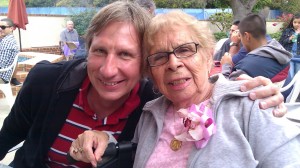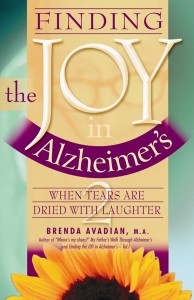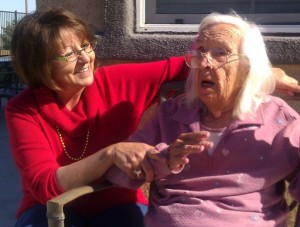Why do we continue visiting a nursing home, adult day care, residential care home, assisted living community, or even a family, after a loved one is gone?
For many reasons …
- Because other families and the staff become a part of our family.
- To celebrate milestones.
- To have fun.
- To be inspired.
- To learn what’s important in life.
- To remember.
Read 3-short stories below about Lisa, Myron, and Evelyn.
LISA
Last weekend, we drove 177 miles round trip to share Lisa’s 97th birthday. She used to care for her “Chapparo” — how she referred to her beloved husband, Jose, who she described as her Little Man. I struggled to remember his nickname and called him her “chalupa” (boat). She’d laugh and correct me. It only took me several years to learn the difference.
Lisa now lives a month at a time with each of her children. She takes turns enjoying different cities and their love. I’m glad they share her care, as she is a handful! After Jose’s passing, she claimed my husband as her boyfriend. Her family is well-aware of this and laughs. Imagine that — my husband at 44 years her junior! Una Latina con un gringo!
We just love Lisa’s spirit and zest for living!
MYRON
After my father’s stroke resulting from Alzheimer’s, which took his life, I continued visiting the families who like me had placed their loved ones in the care of full-time professionals. The families and staff who gave life-giving and loving care became my family.
The following edited excerpt is from Finding the JOY in Alzheimer’s – When Tears are Dried with Laughter (pages 135-136). For more excerpts, click on Excerpts – Finding the JOY in Alzheimer’s: When Tears …
Myron [name changed] was assigned to the empty bed in the semi-private room with my father. He reminded my husband and me of my father, so we enjoyed his antics.
Myron runs the place.
Staff members cringe when I jokingly say this, because Myron actually tries to run the place!
He carries a notepad, pens, and pencils in his shirt pocket and takes notes and records appointments.
Like my father, Myron walks the halls frequently. Purposeful, much taller than my father, wearing glasses and a baseball hat, he supervises everything he sees. I greet him. “Hey Myron, are you holding down the fort?” He looks at me. I continue, “Are you making sure everyone is doing what they’re supposed to?” His face breaks open into a smile followed by laughter and a hearty, “Yes.”
When he’s sitting with other male residents in the chairs lining the hallway, he’ll smile and extend his hand as I approach. I tease him about being mischievous, “Hey, Myron, are you guys up to no good?”
Sadly, this disease takes away something from Myron every day.
Myron sits on one of the chairs. He is alone, his head is lowered, and he naps. Sometimes, I will gently wake him. Initially, he’ll look surprised then his face breaks into a big smile.
His smile is worth everything.
EVELYN
It’s been more than a decade and David and I continue visiting. Myron has passed and, these days, we visit mostly with former caregivers. Some need care themselves like Lisa (above) and Evelyn, my literary “Okie” friend, who now lives in a residential care home. My husband and I make the 100+ mile round trip to visit “Evelyn and the Ladies.”
Who are the ladies?
A ninety-something German artist whose museum-quality sculptures and paintings adorn the room she and Evelyn share. She still gets upset by her recollections of her childhood under Hitler’s rule.
A fun-loving ninety-something who can still dance. Her stories remind me of The Help, except she speaks lovingly of the white family she and her family worked for.
The fashion model in her sixties, who lives with severe bipolar disease, yet has enough sense to warn me about the German artist’s severe nut allergy when I bring treats for the ladies.
These are the ladies that my husband and I enjoy visiting because as David says, “They bring history to life!”
We are grateful for their caregivers — a couple from the Philippines and a mother from Micronesia–who take good care of them, so we can still visit “Evelyn and the Ladies.”
Lisa, Myron, and Evelyn are just three of the many people we continue visiting for many reasons after my father died.
What are your reasons? Submit your comments below.
Brenda Avadian, MA
Alzheimer’s / Dementia Caregiver, Expert Spokesperson, Coach, and Author
Editor, TheCaregiversVoice monthly Newsletter and The Caregiver’s Voice Book Review











